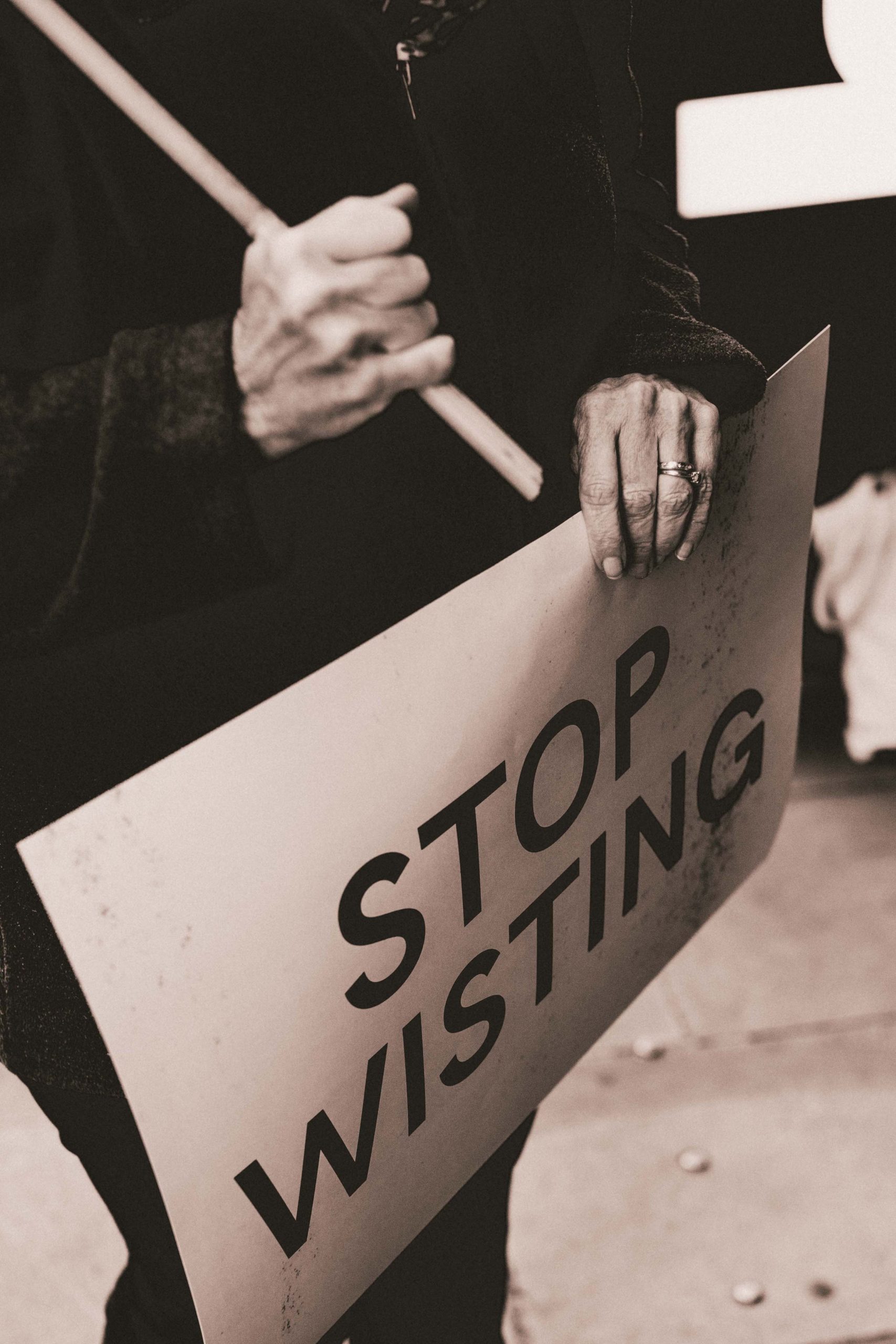Protestors oppose TED Talks’ platforming of oil bosses
- Text by Ben Smoke
- Photography by Theo McInnes

Today (6 October), dozens of activists gathered in the early morning sunshine outside of the Barbican centre. The demonstrators, who represented groups ranging from Greenpeace to grassroots organising groups like Stop Cambo, came together to picket a TED Countdown summit taking place in the central London venue.
The summit, organised by TED Talks and part of the non-profit’s climate initiative, seeks to “put ideas into action” where preventing climate change is concerned. Lauren MacDonald was one of those who took part in the picket this morning. Speaking to Huck, MacDonald explained that the activists – who held banners, distributed leaflets to attendees and chanted – were there to protest the platforming of oil executives at the summit.
“Today we are outside the TED Countdown Dilemma series where representatives of fossil fuel companies and banks that are funding the climate crisis are coming together in conversation about how we phase out from fossil fuels,” she says. “We are here to hold them accountable to the responsibility that they have for the climate crisis.”

The event this morning included representatives from Equinor, a Norwegian oil giant, who have submitted an application to drill the biggest undeveloped oil field in the North Sea called Rosebank.
“If Rosebank were to go ahead” Macdonald, who is part of the Stop Rosebank campaign, continued, “it would create more co2 pollution than the combined annual co2 emissions of the 28 lowest income countries combined, so from this one field, it would create more co2 than 700 million people in the global south produce in a year. Equinor has a vast responsibility not to go ahead with this field, the UK government must reject it and we’re here to call for that.”
Representatives from other fossil fuel companies including BP were invited to speak. Activists have claimed that TED is providing a platform for fossil fuel companies to greenwash and “continue their rhetoric of lies”. Last year MacDonald challenged Shell CEO Ben Van Beurden on stage at TED Countdown over the company’s complicity in climate breakdown.
“These spaces need to directly hold the fossil fuel companies and those causing the climate crisis responsible, and if they are not doing that, then it begs the question: whose side are they actually on?” MacDonald told Huck.

Also present at the demonstration were representatives from Fossil Free London. Robin from the group told Huck, “Our life support systems are being suffocated by the likes of Equinor and BP. London – and the world – will resist these oily executives. Forty years of climate disinformation speaks for itself. They cannot be trusted to have a good faith conversation, so we continue to protest and to ask for people to join us in resistance to demand one simple thing: our survival.”
In a statement given to Huck, TED Countdown stated: “Activism and efforts to address the climate crisis take many forms. We support the right of people to protest, including against those they hold responsible for climate change. Our work includes convening people for difficult, candid conversations about some of the toughest issues we face. Eighty percent of today’s global energy comes from fossil fuels – we’re focused on how we shift away from this, to clean, secure affordable energy as fast as possible. We do not believe we can accelerate progress by refusing to talk to the incumbents who are responsible for the bulk of today’s energy supply, and we’re committed to holding space for this difficult work.”







Follow Theo McInnes on Instagram.
Enjoyed this article? Like Huck on Facebook or follow us on Twitter.
You might like

Led By Donkeys: “It’s weird when right-wing commentators get outraged by left politics at Glastonbury – what did they expect?”
Send them to Mars — With their installation in Block9 launching the billionaire class into space, we caught up with the art and activism crew to chat about the long intersection of music and politics at the festival, how wrong the tech bros are, and more.
Written by: Isaac Muk

Jeremy Corbyn confirms new party with Zarah Sultana: “Change is coming”
A real alternative? — Sultana revealed that she was quitting the Labour Party yesterday evening, saying that she was going to co-lead a new party with the former Labour leader.
Written by: Isaac Muk

There have never been only two sexes — intersex people exist
Hemaphrodite Logic — Juliana Gleeson’s new book explores the intersex movement from 1990-2025. In this exclusive extract, the author outlines intersex liberation as an “unlikely offspring” of feminist and gay/lesbian struggles.
Written by: Juliana Gleeson

In photos: Hundreds gather outside court to protest Kneecap terror charge
‘Free Mo Charah’ — With drums, smoke and applause, protesters greeted the rapper outside court as he was released on unconditional bail.
Written by: Ella Glossop

Misan Harriman: “The humanity I bear witness to is extraordinary”
Shoot the People — Following the premiere of a new film exploring the photographer’s work and driving forces, we caught up with him to chat about his rapid rise, shooting protests and the need for powerful documentarians in times of struggle.
Written by: Isaac Muk

Transphobia is the main reason why people ‘detransition’, according to new survey
Transphobia’s toll — The largest ever survey of its kind found that just 9% of respondents had "gone back to living as their sex assigned at birth at least for a little while at some point in their lives”, with the biggest reason being discrimination, harassment and being shunned by friends and families.
Written by: Ella Glossop

